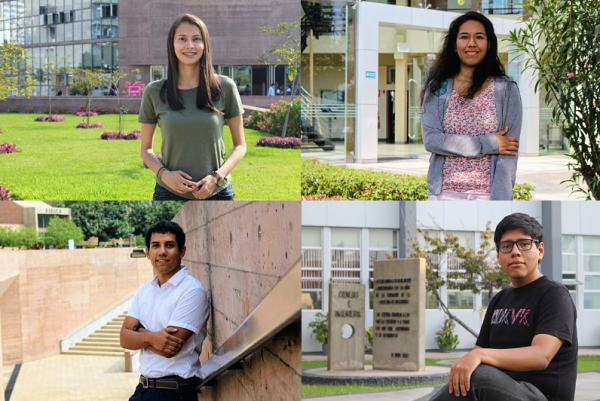
Seeds for the Future is a social responsibility program organized by Huawei, whose objectives are to enhance local talent, transfer knowledge and generate interest in the sector of telecommunications. Estefany Kuong Montalván, Kristel Añazgo and Daniel Plasencia, from Telecommunications engineering, along with Sebastián Herrera, from Electronic Engineering, were the students selected to participate in the program.
The program took place in China and it lasted two weeks. During the first week, the selected students had to familiarize themselves with the Chinese language and culture, through classes at Beijing Language and Culture University, as well as through visits to touristic places. On the second week, students visited Huawei’s Shenzhen headquarters, where they received classes in topics related to information and communications technology, in addition to laboratory sessions where they could complement what they had learned.
How was your personal process of application and selection?
Estefany Kuong
In order to apply, you needed to present a recommendation letter, along with filling a form with a brief personal presentation. In my case, my letter was written by the professor Angelo Velarde, who is my thesis advisor and the coordinator of the group of research on the Internet of Things, which I am a part of.
The first step of the selection process was to take a test in English that evaluated topics of telecommunications, grammar and logical reasoning. After the exam, some students were selected, according to the score obtained, to meet Huawei’s representatives in a personal interview where they could get to know us better, and they asked how much we knew about the program and if we were interested in Chinese culture.
Lastly, we had a final interview with the general manager of Huawei Peru and other representatives, in which they inquired about our technical knowledge and what we knew about the company. Overall, I think it was very important that they tested our ability to express ourselves in English, since that was the only way we had to communicate in China, both socially and technically.
What were your motivations to apply to this program?
Sebastián Herrera
As a student of Electronic Engineering, I knew that this was a once-in-a-lifetime opportunity. I realized that I could broaden my knowledge of the technology and projects that are being developed abroad, with the goal of fomenting research and the development of solutions. I could learn more of a different culture through a first-hand experience and, at the same time, I could share my culture with the people that I would meet or interact with throughout the program.
Daniel Plasencia
I thought it was a great opportunity to continue learning about my field of study and what better than doing so in a Telecommunication leading company such as Huawei and in the very headquarters in China, where I could learn about the latest technology in the sector. I was also motivated by the possibility of getting to know another culture and being able to interchange ideas and knowledge with people from other countries.
What abilities do you think you learned or improved during your internship?
Estefany Kuong
With this experience, I enhanced my capacities of working in teams and under pressure, and I acquired new knowledge in another language. In addition, I learned to work with technologies that were different from the ones that we usually use in the PUCP laboratories, so I also gained some experience using telecommunications equipment.
Daniel Plasencia
First and foremost, I broadened my knowledge in the area of technology in the field of telecommunications. I also became more fluent in English, since it was the language we used to communicate during these two weeks.
Sebastián Herrera
I enhanced my interpersonal abilities, I met people with different ways of thinking, and I was enriched by their experiences. There were ten Peruvians; we all traveled together and, because of that, we were able to strengthen our tolerance, patience, empathy, responsibility and commitment to each other. Furthermore, it reinforced my abilities of self-learning and researching.
What knowledge acquired in your undergraduate program at the PUCP do you think was the most useful and valuable during this new experience?
Estefany Kuong
First of all, the technical basis we learned in our field of study were our main reference when we took the classes on technology, since they allowed us to associate, apply and complement the concepts we discussed in the classrooms.
Secondly, I consider that the presentations and exhibitions of projects that are mandatory in some of the courses allowed us to come up with the confidence that is required to speak in public, introduce yourself and share ideas with new people.
Furthermore, it is worth mentioning that the quality of the personal and academic formation has been fundamental in the selection process, in which the PUCP has stood out by having the largest amount of chosen students, in comparison with the other universities that also participated.
Kristel Añazgo
In my opinion, the level of exigence and the quality of teaching at the PUCP allowed me to have a good score on the written exam, which was an advantage over the participants of other universities during the first stage. Likewise, working in teams helped me express myself easily and in a new environment that was very exigent.
Daniel Plasencia
Mainly, the knowledge coming from the courses that we took during the last two years, regarding cellular network, networking, safety, radio broadcasting, etc.